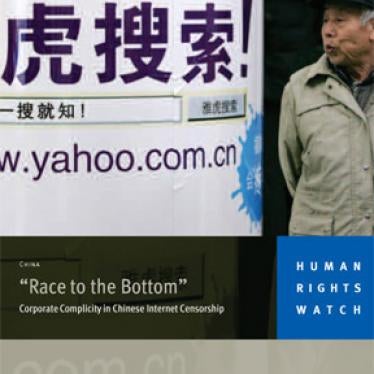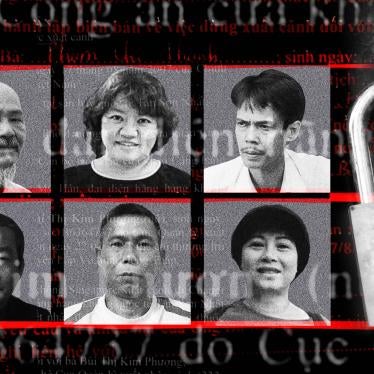(London) - Chinese authorities’ closure of a leading Tibetan intellectual’s blogs signals another online chill, Human Rights Watch said today. Oeser, whose blog at http://woeser.bokee.com was closed in late September, is the first Tibetan writer inside the mainland to openly raise in Chinese critical questions about China’s role in Tibet and to urge Beijing to negotiate with the Dalai Lama.
“The shuttering of Oeser’s blogs is a sign that another round of media crackdowns is underway on Tibet-related issues,” said Sophie Richardson, Asia deputy director at Human Rights Watch.
Oeser, born in 1966, graduated with a degree in Chinese from the Southwestern Institute for National Minorities in Chengdu, and later attended the Lu Xun Academy of Fine Arts in Beijing as a visiting scholar. From 1990 she worked as an editor of the journal Tibetan Literature (Xizang Wenxue) in Lhasa. She is the author of 10 volumes, including one book of collected poems, a prose volume Notes on Tibet (2003), and two books on the 1966-76 Cultural Revolution which are not distributed in China. She was removed from her position at the Tibet Cultural Association in Lhasa in 2004 after China’s United Front Department and its Publications Bureau determined that her writings contained “political errors” due to the positive references in Notes on Tibet to the exiled Tibetan leader. Oeser has reportedly has been unable to apply for a passport since then.
Because readers in China have no access to her books, Oeser began to make extensive use of the Internet to disseminate her writings. In February 2005, Oeser established her first blog through www.tibetcult.net.
Although the first Tibet-related websites and blogs were launched around 2000, Oeser’s blogs set a new standard for frank discussions on a number of highly sensitive issues, such as HIV/AIDS in Tibet, the Tibet railway, the 40th anniversary of the Cultural Revolution, the anniversary of the events in Tibet in March 1959, and other sensitive matters. Oeser’s blogs prompted an increasing number of Tibetan and ethnic Chinese intellectuals, and many from other minority groups, to publicly debate topics relating to Tibet, including ethnic discrimination, environmental degradation, and cultural dilution as a result of migration.
Over the course of 2005 and 2006, some pages of www.tibetcult.net were temporarily shut down and then reopened. Around May 2006, Oeser also was invited by a friend to blog on a list hosted by www.daqi.com. Although the blog hosted by www.daqi.com was not as popular as the earlier one through www.tibetcult.net, both blogs were shut down in late July 2006.
In August 2006, Oeser made a third attempt at electronic discussion via http://woeser.bokee.com. On September 21, Oeser took part from Beijing in a live broadcast on the U.S.-based broadcasting service VOA to discuss rare photographs she had recently published of the Cultural Revolution in Tibet. Her blog on http://woeser.bokee.com was removed by authorities in late September.
In recent years, the Chinese government and Communist party officials have moved aggressively to shut down websites, blogs, and other electronic forums that discuss what the government considers sensitive topics, using a sophisticated network of human and technological controls. Journalists, bloggers, webmasters, writers, and editors who sent news out of China or who even debated among themselves about Tibet, Taiwan, and human rights, among other subjects, have faced punishments ranging from sudden unemployment to long prison terms. In an August 2006 report, “Race to the Bottom,” Human Rights Watch extensively documented Chinese government censorship of the Internet (https://www.hrw.org/reports/2006/china0806/).
In January 2005 five Tibetan monks from Drakar Trezong Monastery in Qinghai received reeducation-through-labor sentences of up to three years for publishing a journal called “Great Rays of the Sun and Moon,” which authorities alleged contained “splittist” views. The monks were on the editorial team of the journal. And in July 2006, the Chinese Communist Party’s propaganda department barred domestic media outlets from carrying stories about Princess Yabshi Pan Rinzinwangmo, the daughter of Tibet’s late 10th Panchen Lama. Panchen Lamas are second in importance only to Dalai Lama, and are seen by Chinese authorities as a symbol of resistance to their authority.
China has signed but not ratified the International Covenant on Civil and Political Rights, and it allows virtually no freedom of speech, assembly, association, or religion in Tibet. Those who oppose Chinese rule are frequently detained and tortured, and even those simply practicing their religion are often subject to harassment and worse.
“If China is serious about autonomy with respect to Tibet, it must permit free, unfettered debate about Tibet and conditions there,” said Richardson.







